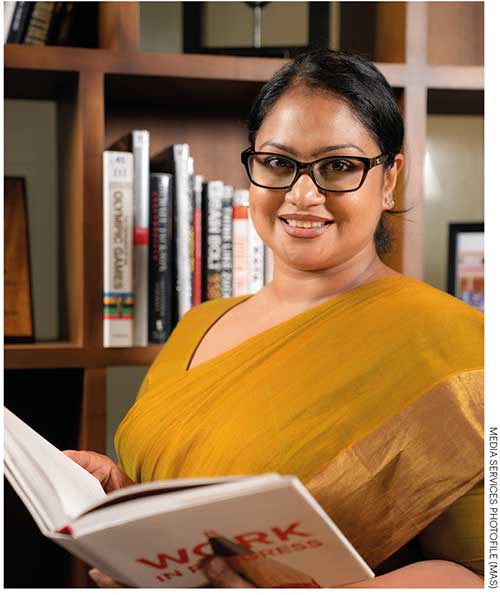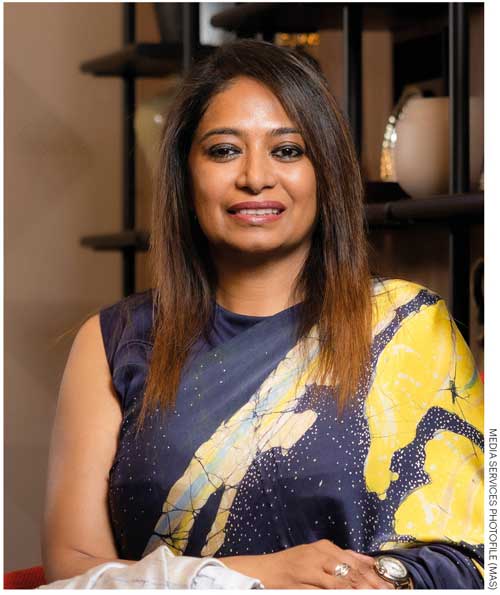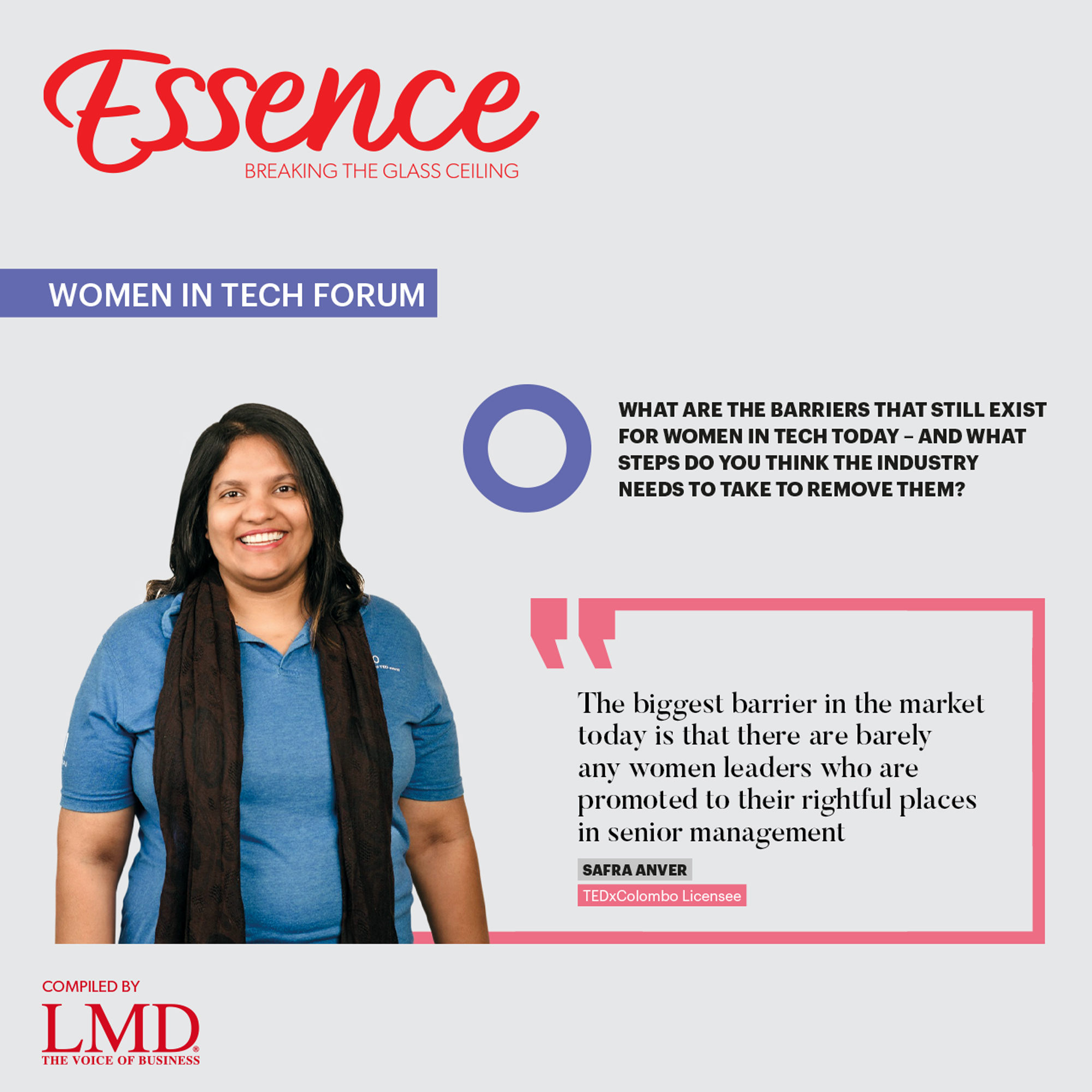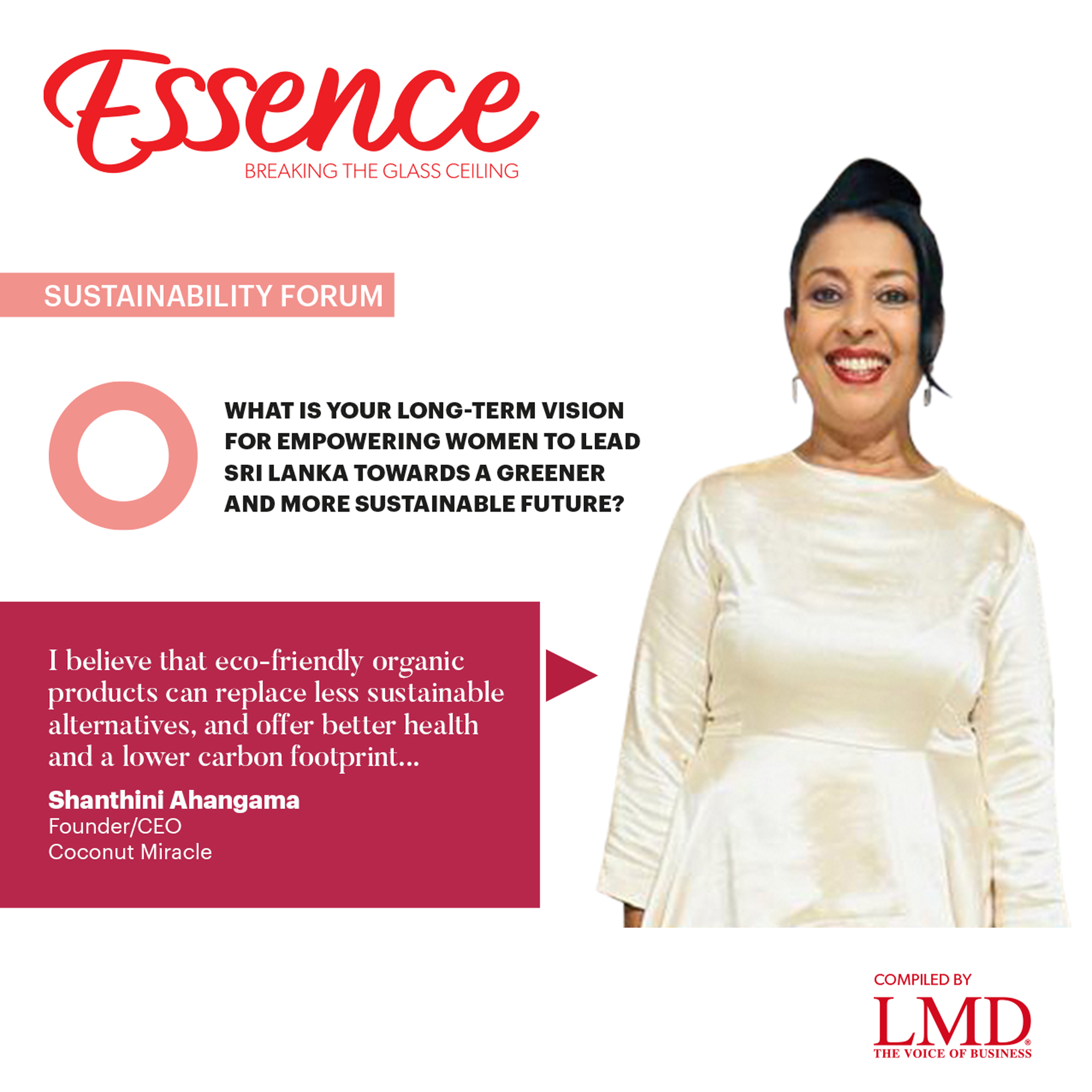MAS
Director Planning
MAS Intimates
Director Human Resources – Organisational Development
MAS Intimates
Q: How does the organisation demonstrate accountability and commitment to promoting gender diversity?
Chamalika Ranawaka (CR): MAS’ social sustainability strategy commits to 30 percent of women in management by 2025 with strong operational plans to increase parity and representation. This is enabled by organisational goals and individual key performance indicators (KPIs) for leaders, ensuring top-down involvement in driving gender diversity.
There are policies on inclusive recruitment and training practices, supportive workplace initiatives for childcare, flexible work policies and parental leave that make the business a family friendly organisation.
I get the opportunity to mentor young women in the pipeline whilst our executive committee is part of sponsorship programmes for young leads. Over the past five years, there has been a culture shift with mindset and behavioural changes that enable our representation goals.
Manique Jeyasooriya (MJ): MAS’ hallmark Women Go Beyond (WGB) programme, in its 20th year now, empowers women on the shop floor, as well as their families and communities.
The programme has provided more than five million learning opportunities for women in the past two decades, creating a more empowered workforce with female role models taking learning back to their homes and communities.
MAS has been recognised for this by our brand partners and groups such as the United Nations Entity for Gender Equality and the Empowerment of Women (UN Women) and academia. WGB has also resulted in greater workplace self-efficacy. The career advancement pillar prepares team members for progress, supporting upward mobility.
MAS’ lean culture creates pathways for women-led innovations, greater job autonomy, problem solving and continuous improvement. Today, we have also commenced preliminary awareness for sexual orientation, gender identity, gender expression and sexual characteristics (SOGIESC) diversity in our workforce.

Q: How has the organisation’s work in driving gender equality impacted your career?
CR: Growing up with progressive parents who treated my brother and me equally, I was somewhat oblivious to the reality of gender inequality in the world, inherently expecting equal and fair treatment for men and women.
I joined MAS in 2005 as a management trainee, and was exposed to leadership that nurtured the talents and capabilities of individuals, not based on gender. Women at MAS have an equal voice, are seen and are given the same respect as their male counterparts, and career accessibility is based on merit.
However, the difference lies in societal constructs and expectations of women. Our biological clocks seem to be synced with career progression – becoming a wife and mother comes almost at the same time as a promotion and increased responsibility. It is critical to have a strong support network both at home and work.
There was a point in my career after my daughter’s birth when I felt overwhelmed and questioned if I could really do both. It was the support system at work, empathetic leaders and the flexibility to balance priorities that enabled me to move forward as a mother and career woman.
Q: How has Sri Lanka’s economic crisis impacted the country’s journey towards gender equity?
MJ: This is a multifaceted issue. Women face greater vulnerability during crises, being already disproportionately impacted by ongoing gender inequalities. Women from low-income households who engage in informal employment are severely impacted. Cost of living reduces purchasing power, and government investment in female and maternal health is de-prioritised.
Selective investment can lead to higher unemployment levels in neglected socioeconomic groups and difficulty for women to access credit. Outcomes are shaped by government policies and at a meso-level by organisational action.
Women in the apparel industry are key contributors to the country’s economy; and at a shop floor level, many are primary wage earners.
At MAS, we are acutely aware of this reality and work determinedly to ensure job stability. We provide relief packs and childcare support for women to stay in the workforce, and the WGB programme offers entrepreneurial development, which is accessed by many to supplement their incomes.

Q: In your view, are workplaces in Sri Lanka doing enough to inspire inclusion – especially when it comes to women?
MJ: It is important to define ‘workplaces’ as many women engage in informal work. There is still a disproportionate expectation of women to act as caregivers to children and the elderly, balancing this with a professional career.
This mindset exists even in urban or more affluent demographic groups, and some corporates work on sensitisation to reduce the biases of cultural socialisation.
The diversity, equity and inclusion (DEI) work done by larger organisations has accelerated in the last five years. Our own accessibility innovations support labour force participation of women and include flexible or remote working options for certain roles, provision of childcare facilities, lactation rooms, parental leave policies and maternity return policies among others.
Larger corporates such as MAS are leading the change and this rights-based approach is gradually cascading to medium and small-scale organisations in the economy. Although we have a long way to go as a country, we have the right start.

Q: How has your organisation adopted new working norms (for instance, working from home) to encourage more women to join the workforce?
MJ: New ways of thinking about work are important to attract more women to the workplace, provide balance for families and increasingly attract Gen Zs irrespective of gender. Defining flexibility and customising based on need is a priority.
MAS rolled out a flexible work policy in 2019, and COVID-19 conditions demonstrated the potential of remote work practices. With a majority manufacturing workforce however, we haven’t fully cracked the code on flexible work, which is accessed by manufacturing colleagues on a need basis.
Supporting managers during this transition is critical. For the future, we are looking at job-sharing, gig work and better use of technology to progress our ways of work whilst sustaining a supportive culture focussed on employee experience, purpose and wellness.
Q: What can organisations do to address the loss of women employees at mid-career?
CR: The leaky pipeline is a common challenge experienced by organisations in their diversity efforts due to women facing increased family and caregiving responsibilities during the mid-career stage. Some women choose to step back and prioritise family over career, and we may lose high-potential women who feel they cannot balance these demands.
MAS provides the right support system to ensure a balance. Support comes in the form of family friendly policies, equal career accessibility, leaders and mentors who are invested in growth, leadership development opportunities, recognition and visibility, flexible work arrangements, and culture shifts to break stereotypes and biases.
However, we don’t operate in isolation and it is time for a macro-level intervention to holistically mitigate socialisation based on gender roles and stereotypes at the societal level. When it comes to meaningful empowerment, culture and mindset are everything.

Q: Can you share with us the nontraditional ways your organisation supports working women to maximise their potential?
CR: Foremost is the hallmark WGB programme that builds leadership talent from within the majority female workforce. There are focussed initiatives and targets to drive upward mobility and women into succession pipelines. MAS’ lean culture has also created greater autonomy for women to take on decision making roles at all levels.
Holistic and creative wellbeing programmes with a focus on women and maternal health, flexible learning paths, job rotation opportunities that support career-life pivots, customised career coaching and women’s networks provide development designed especially for women.
Balance 250 is an inspirational, CEO-led employee resource group (ERG) for inclusive leadership and equal representation of women in leadership by 2025. The Abhimani recognition awards also offer an opportunity to celebrate women on the shop floor who achieve career success and develop others.
At executive level, the programme recognises those with leadership potential; and at senior levels, those who live the MAS values.
Telephone: 4533900
Email: info@masholdings.com
Website: www.masholdings.com







